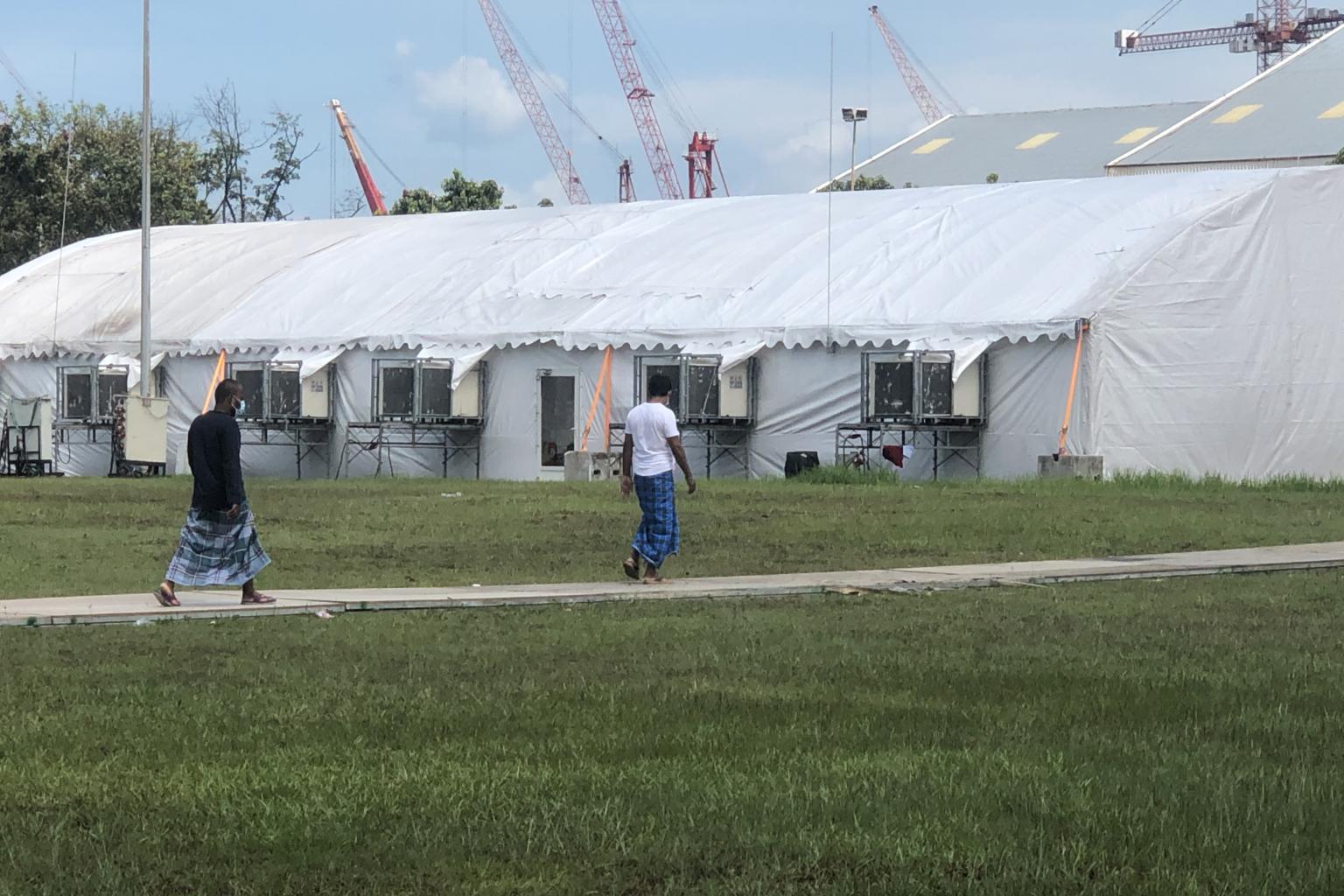3,000 Covid-19 patients housed at six community recovery facilities in SAF camps
Sign up now: Get ST's newsletters delivered to your inbox

Patients are able to move about freely within the community recovery facilities.
PHOTO: MINDEF
SINGAPORE - Last month, Colonel Chua Jin Kiat had about two weeks to set up community recovery facilities (CRFs) in military camps for recovering Covid-19 patients as the Singapore Armed Forces was roped in to help in the national fight against the coronavirus outbreak.
About 600 servicemen under his charge were involved in the preparation, such as building tentage, setting up facilities like dining areas and portable toilets, and ensuring patients are medically screened and briefed on arrival.
Six CRFs - at Amoy Quee, Bedok, Jurong, Guillemard, Lim Chu Kang and Tanjong Gul camps - started taking in patients on April 28. The latter three camps are vacant, while the others have standalone accommodation facilities separated from the rest of the camp, with no operations there.
About 3,000 foreign workers are being housed at the six CRFs so far, out of a total capacity of about 5,300.
The regular servicemen who helped in this effort do not do it as part of their usual day jobs, said Col Chua, 41, who is commander of the task force in charge of SAF-managed CRFs. He added that they have put in long hours and much effort into running these places.
"All the commanders in the camps tell me that they don't want to treat the patients like sheep and just move them from point to point. They have poured a lot of their own heart and passion into running these places," he said, noting that the workers have also shown gratitude for the way they have been treated.
Col Chua, who is also commander of the 9 Division and Chief Infantry Officer, was speaking to reporters in a teleconference on Wednesday (May 6).
CRFs are meant for patients who remain well at the end of their 14th day of illness and who do not require further medical care.
The authorities had announced on April 28 that more than 10,000 bed spaces will be available at such facilities by the end of June, including at SAF camps.
Such facilities are part of a strategy to provide differentiated care to Covid-19 patients with different needs, alongside hospitals and community care facilities (CCFs). CCFs are meant for those with mild or symptoms.
Col Chua said that they took the patients' needs into account when designing the facilities. For instance, open spaces such as at fields were cordoned off for patients' use, so they can head there for a breather and to stretch their legs. Wi-Fi access was also provided, and each bed has its own charging point.

Patients consulting the roving medical team at the Community Recovery Facility (CRF) at Tanjong Gul for minor ailments such as headaches.
PHOTO: MINDEF
Areas have also been allocated for the patients to wash and dry their clothes. Mobile vendors have also been engaged to sell things that the patients need out of their vans, for instance, clothes, towels and soft drinks.
On safety measures, Col Chua said that three different zones are set up in each CRF - red, yellow, and green - and staff need to be geared up differently according to the requirements in each zone.
For instance, in red zones, where the patients spend most of their time, face shields, masks, gloves, hair nets and gowns are mandatory. In green zones, which patients do not access, only a face mask is required.
About 1,300 healthy foreign workers staying in dormitories were temporarily housed in Bedok Camp II and Jurong Camp II last month, and have since moved out, said Col Chua.
SAF will be handing over management of the CRFs to facility managers from the private sector in the next two to three weeks as the regular servicemen will be needed back at their primary jobs "at some point in time", he added.
The SAF servicemen involved come not just from the headquarters of 9 Division, but also from the guards formation, the Combat Service Support Command and Army Medical Services, which provides doctors as part of roving teams giving basic medical care.
Supervision will continue to ensure that the managers know how to run the facilities, Col Chua said.
While there have been some complaints about food due to the large number that has to be catered for, Col Chua said that overall feedback has been "very positive" and there is a general sense that Singapore "is a country that cares".
Throughout the process, from the time patients fall sick, "there's been nothing but care and concern from everybody", he said.
"And that's a reflection not just on the SAF, but also I think the whole of government and everyone who has played a part in this whole chain in getting them to recovery," said Col Chua.
"I would say that, as a participant of this effort, I am truly very proud of what we have done. And I think my guys on the ground will feel it even more. Because the 'thank you' is said to them face to face."


